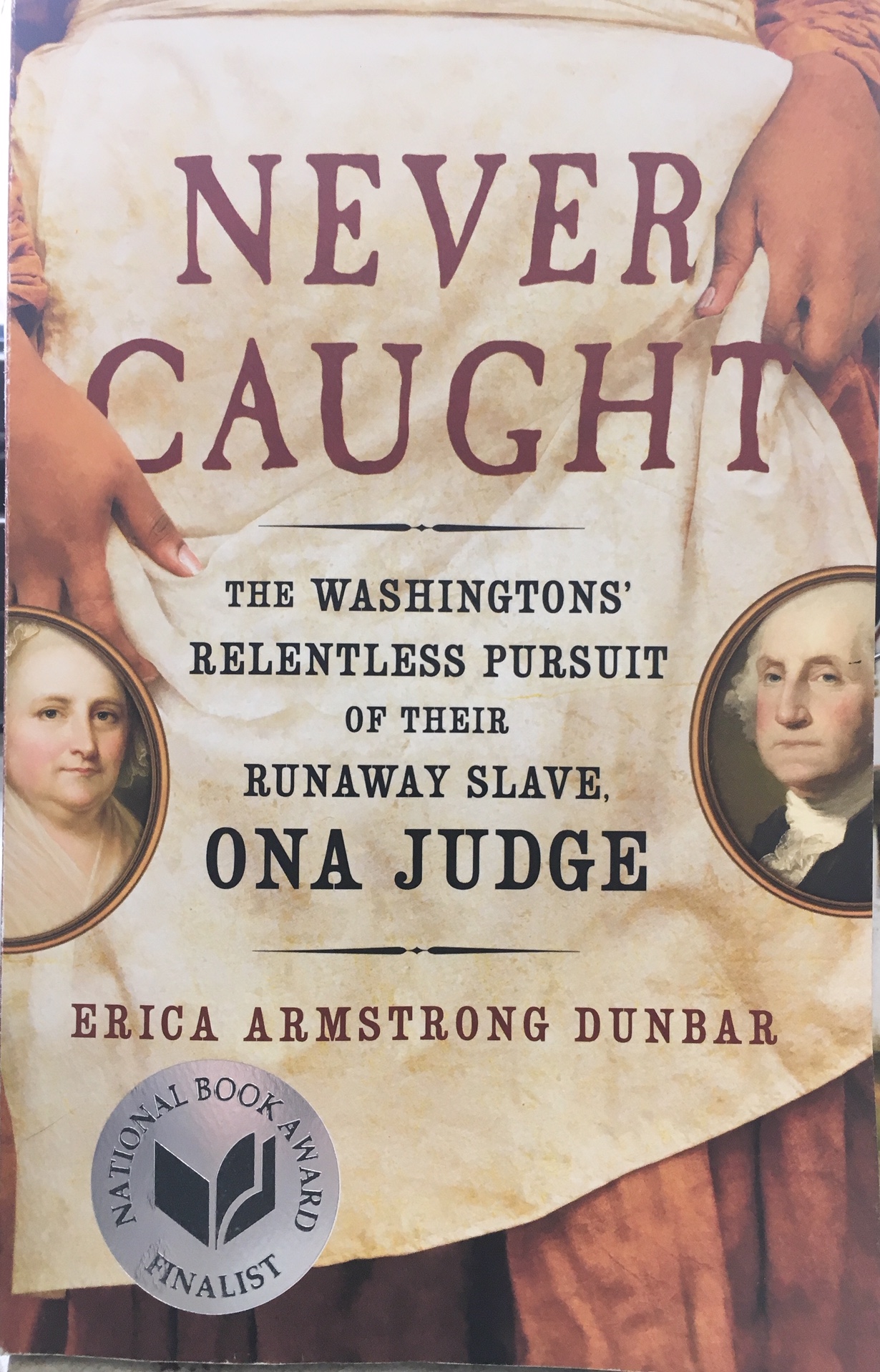Ona Judge slipped out of her master’s house as the family ate Saturday dinner and escaped bondage. She was 22 years old. That night, she boarded a ship bound for Portsmouth, New Hampshire, 400 miles to the north. It was 1796. Her master was George Washington. He was in his second term as president of the United States in the country’s capital, Philadelphia.
Washington advertised in local newspapers. They described the runaway as “a light Mulatto girl, much freckled, with very black eyes, and bushy black hair…of middle stature, but slender and delicately made.”

In Never Caught: The Washingtons’ Relentless Pursuit of their Runaway Slave Ona Judge, historian Erica Armstrong Dunbar tells of Ona Judge’s early life in Mt. Vernon among family, her involuntary move to Philadelphia as Martha Washington’s personal maid, her daring escape to New Hampshire and her life passing as a free person. She also tells of the Washingtons’ determined efforts to recapture her, including Washington’s use of the power of the federal government.
In telling one slave’s story, Dunbar casts light on the physical and emotional hardships that slavery inflicted on bonded persons regardless of the status of their owners or the nature of the slave’s work. In Washington’s home in Philadelphia, the slaves slept crowded in the attic, rooms that were coldest in winter and hottest in summer. Dunbar points out that Ona, as with most house slaves, lacked privacy and private time: her time was never her own. For all slaves, the threat of separation from family and friends due to being sold or moved was ever-present. Women were always alert to unwanted sexual advances, but often could not avoid assaults. Every slave was subject to the whim of the master, no matter how impractical, unjust or dangerous.
Life events in the master’s family – births, marriages, deaths, moves – were sources of consternation for slaves. A death could lead to the sale of slaves to raise money to pay debts. Parents often gave slaves to their children on their marriage or at the birth of a child. All these maneuvers resulted in slaves possibly never seeing their family again.
The event that precipitated Ona’s decision to escape was Martha Washington’s decision to give Ona to her granddaughter on her marriage. Eliza Custis was labile and stubborn, known for her “stormy reputation.” Moreover, the newlyweds planned to live in the new Federal City (Washington D.C.). Ona would again be torn from people familiar to her, the people she had been with for nearly seven years in Philadelphia.
Many factors came together to make Ona’s escape possible: the fact that she was in a Northern city; Philadelphia’s free blacks who helped her; the abolitionist movement which gave her courage; and Ona’s relatively high status in the Washington household, which allowed her to slip out.

Ona’s grit was evident on the ship voyage. For five days, she had to remain calm and not give herself away to curious passengers. A young black woman traveling alone was most unusual. She settled in the Portsmouth and lived there the rest of her life. She was never really safe because the Fugitive Slave Law of 1793 gave slave owners the right to recover escaped slaves even in free states.
Life for free or fugitive black persons was harsh. Employment consisted of arduous physical work. For women, it would be lifting tubs of water for laundry, scrubbing clothes and floors, getting up before dawn to make breakfast for the employers’ family. Some men, like Ona’s husband, worked as seamen. At sea, they were safe from slave catchers. John Staines was a freeman, but slave captors did not always care whom they captured.
Ona and her husband had two daughters and possibly a son who died young. They lived on the edge of survival their whole lives. At the end of her days, Ona was so poor that she boarded with another family. Both her children and her husband predeceased Ona. In an interview with an abolitionist newspaper in 1845,when she was in her 80s, Ona had no regrets about the steep price she paid for her freedom. Unlike slaves, she was able to marry. She kept her family together. She learned to read and had found faith in God.
***
George Washington’s advertisement yielded no results. He found out about Ona’s whereabouts in Portsmouth through an acquaintance. Wanting to avoid publicity and afraid of anti-slavery sentiments, Washington sidestepped legal means to get Ona back. Instead, he asked his Secretary of the Treasury to contact his customs collector in Portsmouth. This man was instructed by Washington to capture Ona and “put her on board a Vessel bound immediately to this place – or to Alexandria, which I should like better.” The customs officer did not know how to refuse the president. To his credit, after speaking to Ona, he refused to manhandle her. George Washington could only fume.
Three years later in 1799, Washington, now out of office, tried again to recoup his human property. This time, he asked his nephew, a Virginia state senator, to go to New Hampshire. He found Ona home with her first baby. Her husband was at sea. This nephew plied her with lies. He told her she would be well-treated at Mount Vernon. He painted a picture of reunion with her relatives. (Dunbar speculates that Ona worried that her escape might have brought reprisals –harsh treatment or punishment –against her relatives in Mt. Vernon.) He told her that the Washingtons “would set her free when she arrived at Mount Vernon.” Ona did not believe him and escaped to a neighboring town before the nephew returned with a group of men to forcibly capture her.
Washington felt that he could not let Ona Judge’s escape go unanswered for a number of reasons. He and Martha together owned more than 300 slaves. The successful escape of one could lead to unrest and insubordination by all of them. And there was the financial consideration. It wasn’t just Ona’s worth — each of her children also increased the Washingtons’ wealth.

Washington and the other slave-owning Founding Fathers — Jefferson, Madison and Monroe – were men of the Enlightenment who intellectually believed that “All men are created equal.” They all had, at points in their lives, decried the conditions of slavery and the state of the institution. I believe that, in his heart of hearts, Washington sensed the hypocrisy between his beliefs and his slave-owning status. This is why he freed his slaves in his will. This is why the U.S. constitution banned the importation of slaves… but not until 1808. Ultimately, the Founding Fathers lacked the courage of their convictions and let their progeny deal with the slavery issue.
But the Washingtons couldn’t give up their lifestyle. Slavery was embedded in their personal and institutional life by habit and by law. Who would cook? Who would clean the boots? Who would curry the horses? Reap the crops? Tend to guests? Even manumission was a complicated procedure requiring the state assembly’s approval. Slave owners lacked the imagination to see or were willfully blind to the lives of suffering that slaves led.
A society built to keep one set of human beings as property to another must be brutal, convoluted in its reasoning and hypocritical. This led to George freeing his slaves upon Martha’s death, not his own, so that families who had intermarried wouldn’t be split up, as his freed slaves would have to leave Mt. Vernon on becoming free. Martha, however, freed George’s slaves a year after his death. She was uneasy, as Dunbar puts it, that “the only thing standing in the way of freedom of more than a hundred people was her life.”

Here we are today, more than 200 years later, and racial inequality continues. Dunbar has given us a visceral sense of what that inequality meant and what freedom was worth to Ona Judge and other slaves. Awareness and empathy are the first steps to any change. This book has made me think about the institutional, social and implicit biases we continue to accept because it is convenient, helps our bottom line, or is just the social norm. Let us not leave it to our progeny to solve this injustice.
Tell me: About what do you lack the courage of your convictions? As for me, it’s the environment.
7 replies on “George and Martha Washington’s Runaway Slave”
[…] Caught: The Washingtons’ Relentless Pursuit of Their Runaway Slave Ona Judge that I reviewed last year, and Isabel Wilkinson’s The Warmth of Other Suns, which opened my eyes to the horrors […]
LikeLike
Agreed! Very wrong.
LikeLike
Excellent essay. I’m obsessed with Martha’s decision to free her slaves early so that her life wouldn’t be the only thing standing between them and their freedom. I know that we’re supposed to view the decisions made by our country’s founders through the ethical lens of that long-ago time. BUT … when you realize that members of your household might want to kill you in your sleep — that should be a red flag that something in your culture is very, very wrong.
LikeLiked by 1 person
Amen!
LikeLike
I’m intrigued to read this one.
My lack of courage is in being more politically active. I vote, I encourage others to vote, and I have emailed or called my representatives. I don’t have the bladder to march or protest. Unfortunately these are difficult times and we may have to be brave. Mostly we need to be kind.
LikeLiked by 2 people
Wow our complicated humaness..weakness, blindness. I will have to sit with this. Thank you Cathy
LikeLiked by 1 person
Really outstanding, CL. Great job. (Not my official reply!)
>
LikeLiked by 1 person